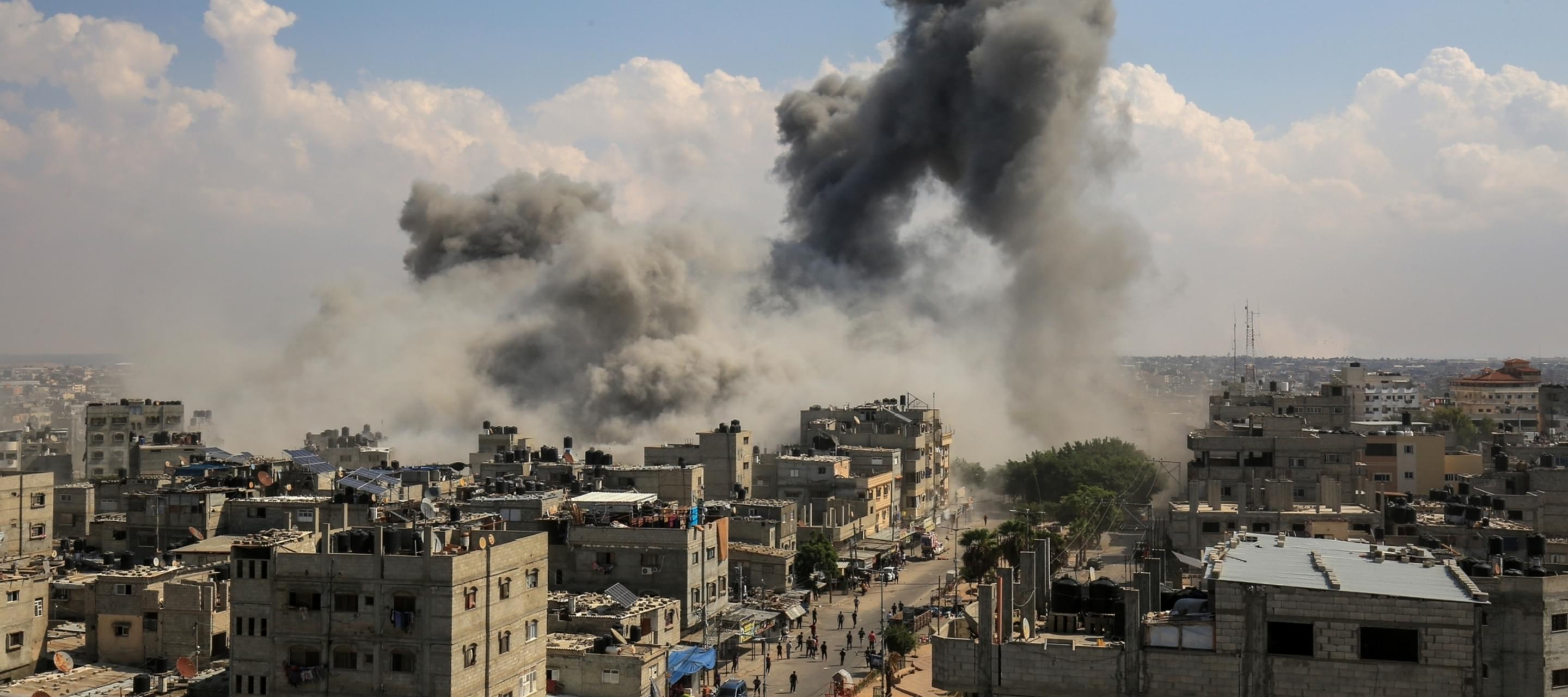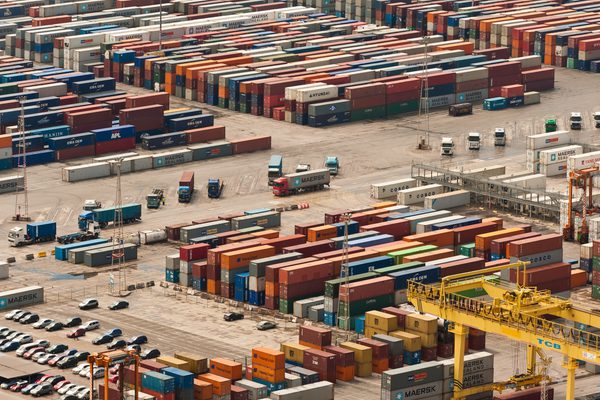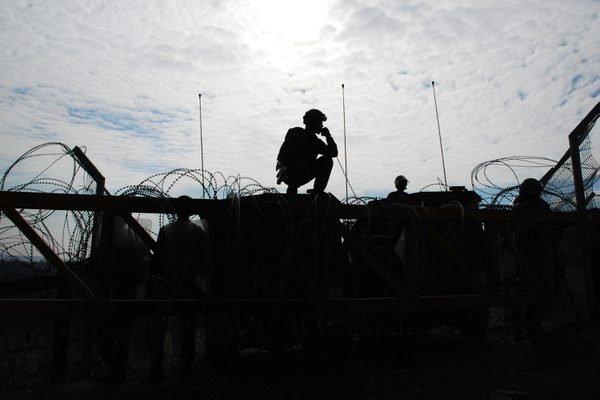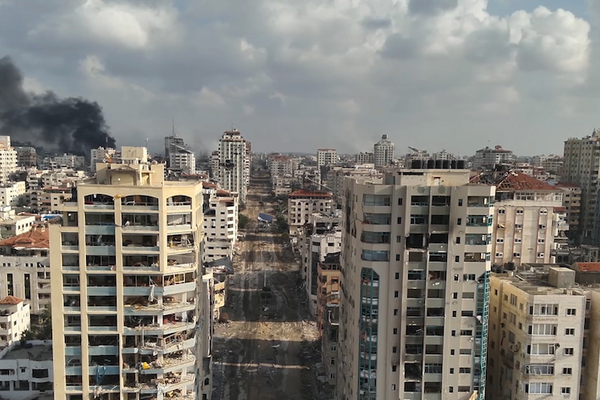The inconvenient truth about business, conflict, and international crimes in Gaza
31 May 2024

The effects of violence ripple throughout a community. Victims, perpetrators, families, friends, neighbours, colleagues are all touched by events. But we are all affected differently.
The effects of war and mass atrocities ripple out across our international system. Palestine. Ukraine. Sudan. The violence of events in these and other places touches us. War and its atrocities kill and maim people we know, destroy places we call home, polarize our politics, and dominate the conversation.
We can try to ignore it, indeed the horrors beamed onto our screens force many of us to look away. But the fact remains that the violent deaths and displacement of thousands upon thousands of people around the world in situations of armed conflict are connected to our lives, whether we like it or not.
One of the principal forms of connection is through our systems of production and consumption. From the natural resources that power our technologies to the financial markets that determine how much our money will buy, war and atrocity are integrated into the value chains that sustain our global economy.
Businesses, corporations, and their allies in governments would prefer that we not mention these realities. Often they are simply desperate to avoid the unpleasant fact that, while war may be political, it is also deeply economic. For some companies, war aligns profit opportunities with the suffering of vulnerable civilian populations. The stock market value of corporations in the arms and energy sectors skyrocketed after Russia’s full scale invasion of Ukraine and again in response to Israel’s attack on Gaza. Unfortunately, there has been a deafening silence amongst the business and human rights community as well on business involvement in international crimes.
Corporations have obligations not to benefit from or contribute to violations of international law, including war crimes, crimes against humanity and genocide. Responsibilities arise for those whose business activities fuel war or aid atrocity. Nowhere is this more apparent than in the industrial supply chain of weapons, and the provision of computing power, to Israel’s military and security forces. Despite the International Court of Justice finding a plausible risk of Israeli genocide against Palestinians in Gaza, repeatedly issuing strong worded provisional measures alongside legal actions in several countries seeking a halt in arms shipments to Israel, the supply of weapons has yet to dry up. Social movements, trade unions, students, and their allies in human rights organisations are forcing the issue of potential corporate complicity in war crimes in Gaza onto the global agenda. In doing so, they are entirely in accord with international law and global norms of responsible business. Indeed, business responsibilities in relation to conflict have been elaborated in norms, rules, and guidelines from the UN and OECD, industry and civil society.
These responsibilities have been flagged in an appeal issued by scholars and practitioners in the business and human rights community for companies to take concrete steps to ensure they, or those they may be associated with do not support international crimes in Gaza.
Scholars and practitioners of business and human rights have long warned corporations that failure to meet their obligations under international law can translate into litigation risks for business in jurisdictions world-wide. All businesses operating in or connected to Israel and occupied Palestine should be conducting heightened human rights due diligence in a manner sensitive to conflict dynamics. In addition, businesses supporting Israel’s operations in Gaza are at risk of litigation arising from their failure to respect human rights. These risks can take several forms:
- Providing the means to kill: liability may arise for a company where it provides weapons or dual-use material – such as fuel or data - to governments or armed groups who use those products to commit atrocities. This may be the case even where import and export regulations are fully respected.
- Financing international crimes: providing financial resources to those who commit international crimes may result in liability, if those resources substantially contribute to those crimes being committed.
- Engaging abusive security force: liabilities may rise even where the actions of the security forces (e.g. killing, torture, beating, abduction, rape) were neither ordered nor intended by the company.
- Allowing use of company assets for abuses: a company may face liability if it provides facilities such as physical or digital infrastructure used in the perpetration of international crimes.
- Expelling people from their communities: a company may face liability if it has provided logistical or other support to forced displacement, gained access to the site on which it operates, where it builds infrastructure, or where it explores for natural resources.
- Investing in occupied territories: a company may be liable for direct perpetration or complicity in international crimes if investments or activities support the occupying forces in violations of laws governing military occupation, such as pillage (e.g. minerals, antiquities) or forced labour.
- Contaminating people’s air, land or water: a company may face court action if acts or omissions result in pollution or other forms of contamination that cause widespread damage to the sources of life.
- Forcing people to work: companies using people working against their will through the threat or use of violence may face liability for forced labour or slavery.
- Handling questionable assets: receiving funds or other property which is associated with criminal activities exposes companies and individuals to legal risks. Holding, managing or hiding such funds, may result in prosecution.
- Trading goods in violation of international sanctions: a company may be held liable for buying, selling or transporting products, commodities or assets originating from or going to a country, group or individual under international sanctions.
Heightened human rights due diligence is necessary, critical, and essential. In the current context, companies can start by checking their value chains against the UN database of businesses operating in connection to Israeli settlements. But any businesses operating in Israel or occupied Palestine should be conducting heightened due diligence to ensure they are not linked to international crimes. An expert group brought together by the prosecutor of the International Criminal Court has advised him to press for charges including war crimes and crimes against humanity. Businesses that may have contributed to or benefited from such conduct run a very high risk of investigation or civil litigation along the lines outlined above. We urge business to take these risks seriously, and those working on business and human rights and corporate accountability to join the call for business to do so.
Guest commentaries reflect the views of the author(s)




